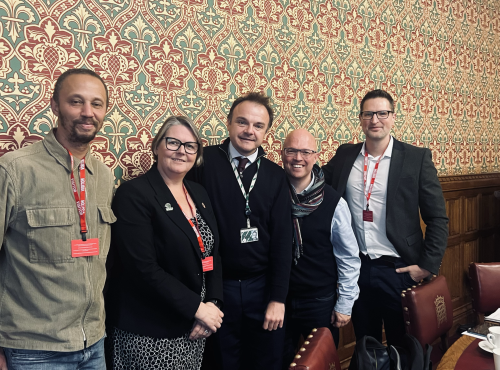Levelling up and the net zero transition: a critical gap
In February 2022, the UK Government published its much-awaited Levelling Up White Paper. It set out how the Government plans to tackle inequalities and ensure opportunities and prosperity are spread equally across the country. This brief paper reflects on the critical gap that exists between the UK’s levelling up and net zero policies. It shows with some practical examples, how the two might be better aligned.
Aligning net zero and levelling up could bring major advantages.
The Levelling Up White Paper does contain mentions of the transition to net zero and the Prime Minister’s vision for a Green Industrial Revolution. But has the Government missed an opportunity by not offering a fully integrated vision for how levelling-up and net zero will work together?
The White Paper acknowledges that the structural shift to net zero ‘could have large and long-lasting effects on virtually every aspect of the economy, including jobs and skills, infrastructure and technology, and investment and innovation’. It also warns of the potential disproportionate effect net zero can have across various parts of the UK, highlights the need for new skills and reflects on some opportunities it can bring.
Brief parts of the White Paper are dedicated to the net zero transition and the Prime Minister’s vision for a Green Industrial Revolution. But when it comes to the details of how exactly the Government aims to ‘level-up’ the UK to challenge and change ‘unfairness’, detailed analysis of the green transition is missing.
With the energy price cap rise from April, significantly more households are at risk of experiencing fuel poverty. In October 2021, already 4 million households were in fuel poverty, with its effects felt unequally across the UK. [1] This is just one issue where Government’s net zero and levelling up agendas could align. Improving the insulation of our homes would be a win-win for helping to reduce bills, reach net zero and levelling up, as Government recognises in its recent Heat and Buildings Strategy.[2] Less leaky homes would immediately reduce demand for domestic heat, cutting the nation’s carbon consumption, and improve people’s quality of life, through increased comfort levels and improved health outcomes. At the same time, retrofit programmes could create jobs and help boost the economy. Through aligning net zero and levelling up agendas, the Government can tackle this challenge and bring benefits across the UK.
[1] National Energy Action. Accessed at https://www.nea.org.uk/energy-crisis/ on 24 March 2022
[2] BEIS (2021) Heat and Buildings Strategy, p.48.
The Levelling Up White Paper promises every part of England (that wants one) a devolution deal and long-term funding settlement by 2030. That presents a valuable opportunity to give local authorities and communities the mandate to deliver net zero. Whilst most local authorities have declared climate emergencies, only one in five have published climate action plans.[1] Among those to set action plans is Bristol City Council, which has plans to reach carbon neutrality by 2030.[2] Devolution of powers, if supported by the necessary funding and resources, can empower local authorities to be ambitious in the governance and administration of net-zero strategies, all whilst levelling up at a local level.
[1] Climate Emergency UK (2022) Council Climate Plan Scorecards.
[2] Bristol One City (n.d.) One City Climate Strategy.
As levelling up and the net zero transition are two key elements of Government plans to bring greater prosperity and better future for all parts of the UK, the lack of alignment between the two is a critical gap.
Current legislation requires reaching net zero greenhouse gas emissions by 2050. All sectors of the economy, as well as all aspects of our lives – our jobs, homes, the way we live, eat and spend our free time – will have to be aligned with that goal. That implies fully aligning all policies and strategies with net zero.
The green transition can bring greater prosperity, healthier homes and lifestyles, and improved well-being for all. It can offer a vision for a better future for all of us which, if managed well, could be a great opportunity for levelling up, too.
Creating a work force with the skills to deliver net zero is a key opportunity for levelling-up. For example, to reach net-zero heating by 2050, the Heat Pumps Association estimate that approximately 50,200 individual installers will be required by 2030, more than a fifteen-fold increase from their 2021 target of 3,200.[1] In the waste sector, there are huge opportunities for green jobs in growing industries of reuse, repair, data and information and circular economy.[2] It is vital that people working in high-carbon industries have coordinated opportunities for upskilling, to avoid exacerbating employment inequalities. Government initiatives such as the Green Jobs Taskforce should embed green skills in levelling up by working with local partners to inform skills plans, as we recommend in Connecting the Watts
[1] BEIS (2021) Heat and Buildings Strategy, p.44.
[2] CIWM (2021) Skills for the Future: The Journey to 2030.
To deliver that potential, we need to make sure to have everyone on board, managing it in a fair way. Tackling uneven challenges and opportunities is a key objective of levelling–up and connecting it with the net zero agenda has the potential to create significant additional benefits.
The Government could benefit from giving further attention to working out the details of how achieving net zero can happen via a fair transition that brings improved health and well-being for all. Connecting it with the ambitions of the levelling -up agenda would be a crucial starting point for this.
Health impacts associated with climate change are felt unequally across the UK. Disadvantaged areas often bear more of the climate burden, due to poor housing and health inequalities, as our report Green Bill of Health set out.[1]By connecting policies already designed to mitigate climate change impacts with the levelling up agenda, Government can hit two birds with one stone. For example, the Urban Tree Challenge Fund and Local Authority Treescape Fund both provide funding for tree planting, which can mitigate the impact of climate change by reducing air pollution, providing shading and reducing flooding risks. Government could link these policies with the levelling up agenda by providing additional support for local authorities with particularly low tree coverage, which would bring benefits for health and wellbeing as well as contribute to reaching net zero.
[1] Policy Connect (2021) Green Bill of Health, p.9.
As the UK goes forward, it is therefore vital to bridge the policy gap that now exists between the levelling up and net zero aspirations with a harmonised plan that connects these two agendas.



